A short-term consequence of a sedentary lifestyle is increased feelings of fatigue and low energy. When you sit for long periods, your muscles become tight, and your overall stamina declines. This leads to difficulty in performing everyday tasks, making you feel sluggish. You might also experience poor posture, stiffness, and decreased flexibility, which can hinder movement. Staying active can combat these effects, making daily life easier. There's more to explore on the benefits of regular movement.
Key Takeaways
- Increased muscle tightness and stiffness, particularly in the hips and back, due to prolonged sitting.
- Decreased energy levels leading to feelings of fatigue and sluggishness throughout the day.
- Impaired cognitive functions, including difficulties with attention and memory tasks.
- Poor posture that can result in discomfort or pain when performing daily activities.
- Heightened anxiety and depression attributed to lower serotonin and endorphin levels from inactivity.
Understanding Sedentary Lifestyle
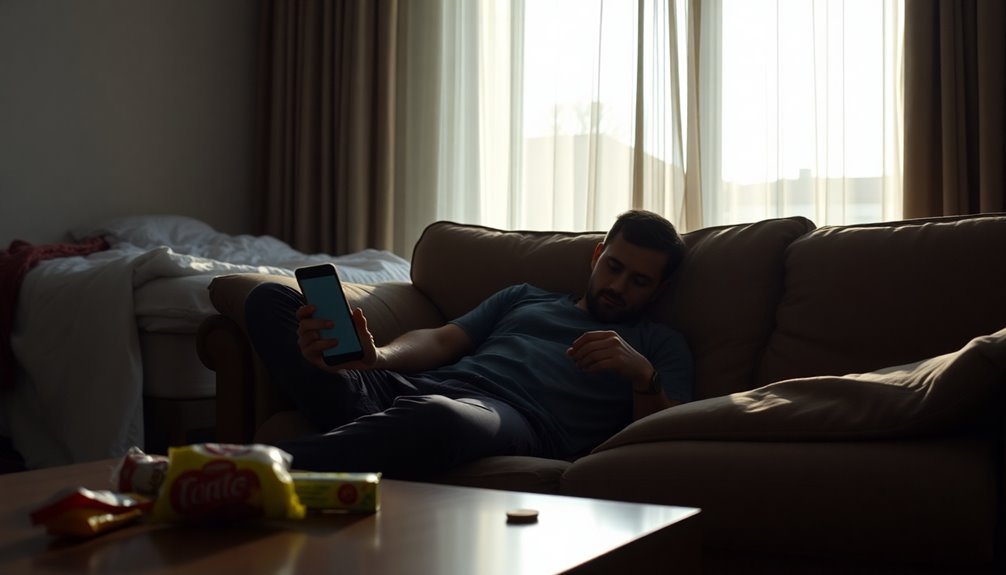
Understanding a sedentary lifestyle is essential, especially since it often creeps into our daily routines without us noticing. You might find yourself sitting for prolonged periods due to computer use or watching television, leading to minimal physical activity.
This lack of movement decreases your flexibility, particularly in your hips, back, and legs, resulting in muscle stiffness. Over time, you may notice difficulty in performing everyday tasks, as poor posture and tight muscles become more common.
With energy expenditure levels hovering between 1.0 and 1.5 METs, it's vital to recognize the short-term consequences of a sedentary lifestyle. By becoming aware of these effects, you can motivate yourself to incorporate more movement and physical activity into your day.
Immediate Impacts on Mental Health
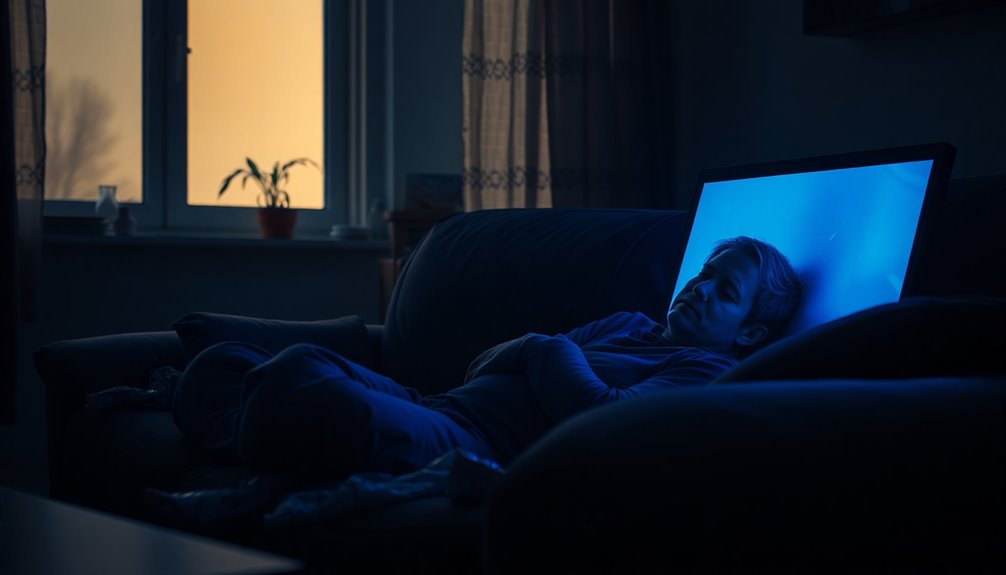
Although you mightn't realize it, the immediate impacts of a sedentary lifestyle on your mental health can be profound. This physical inactivity can lead to increased anxiety and depression, as low serotonin and endorphin levels disrupt mood regulation.
You may notice:
- Decreased energy levels that leave you fatigued
- Impaired cognitive functions, like attention and memory
- Poor sleep quality affecting your rest
- Heightened stress and poor stress management
- A general lack of motivation throughout your day
These short-term effects can greatly diminish your overall well-being.
To combat these issues, consider incorporating even small amounts of physical activity into your routine. It can elevate your mood and improve your mental health, making a world of difference in how you feel daily.
Physical Symptoms of Inactivity

Prolonged periods of inactivity don't just affect your mental state; they also manifest in physical symptoms that can hinder your daily life.
A sedentary lifestyle can lead to noticeable stiffness and a decreased range of motion, making simple tasks feel challenging. You might experience tightness in your muscles due to reduced muscle usage, especially in your hips, back, and legs.
Poor posture from prolonged sitting can exacerbate these issues, leading to discomfort or even pain. Without regular physical activity, flexibility suffers, impacting your ability to move freely.
To combat these short-term consequences, it's crucial to engage in regular physical activity, which can help restore flexibility and improve overall body function.
Don't let inactivity limit your potential!
Effects on Flexibility and Mobility
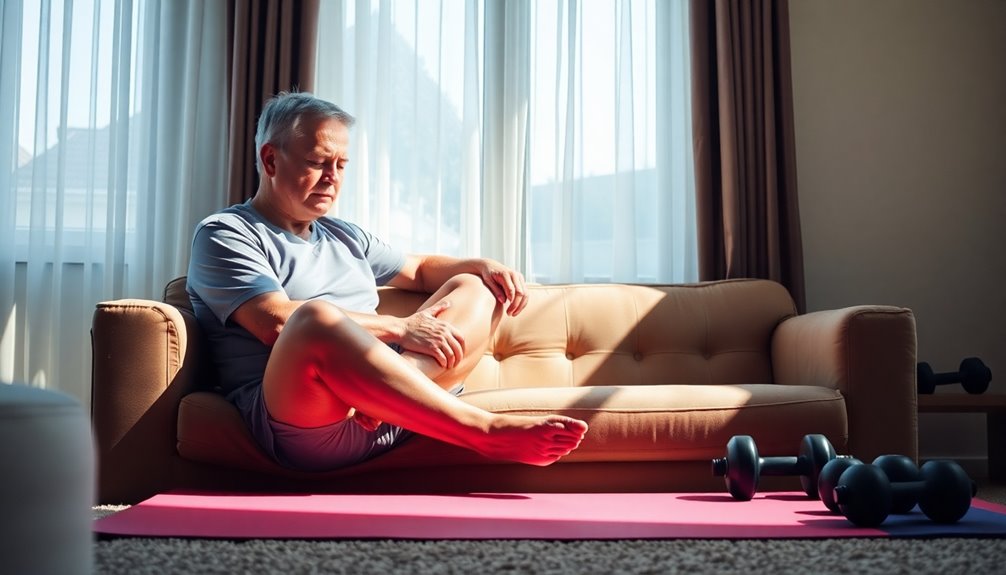
When you lead a sedentary lifestyle, your flexibility and mobility can take a significant hit. Prolonged sitting leads to muscle tightness, particularly in your hips, back, and legs, resulting in decreased flexibility and a limited range of motion.
Poor posture from extended periods of inactivity further compounds these issues. You might find it challenging to perform everyday tasks, like:
- Bending to tie your shoes
- Reaching for items on a shelf
- Stretching your arms overhead
- Squatting down to pick something up
- Walking without discomfort
Engaging in regular physical activity and taking frequent breaks can help counteract these effects, keeping your flexibility intact and enhancing your overall mobility.
Don't let a sedentary lifestyle rob you of your physical freedom!
Changes in Energy Levels
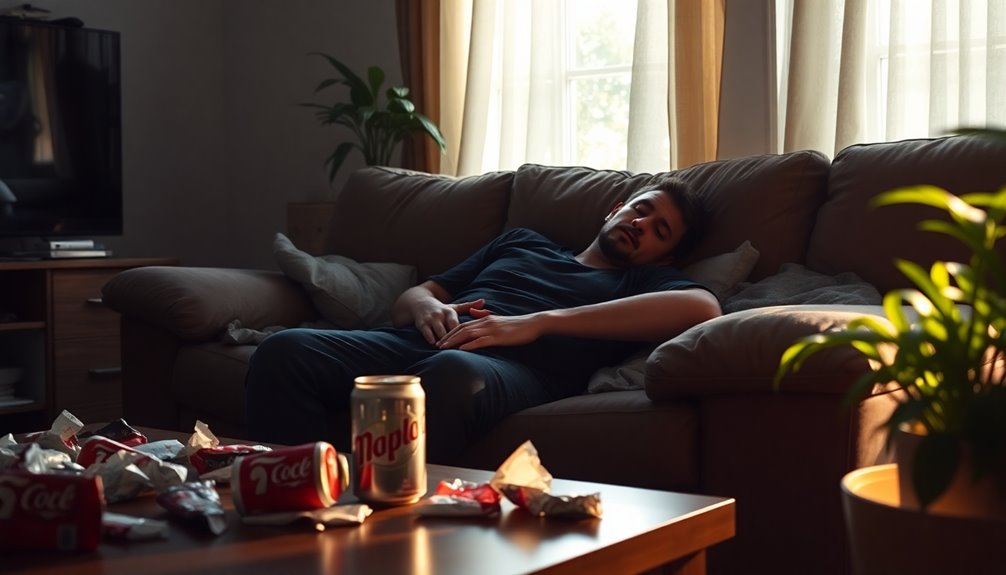
Sedentary habits can quickly drain your energy levels, leaving you feeling fatigued and sluggish throughout the day.
When you lead a sedentary lifestyle, the lack of physical activity contributes to a decline in your overall liveliness and stamina. The short-term consequences of inactivity include increased lethargy, making it harder to tackle daily tasks.
Prolonged sitting decreases your metabolic rate, amplifying feelings of tiredness. To combat this fatigue, incorporating even small bursts of movement into your routine can greatly enhance your energy levels.
Regular physical activity is essential for maintaining ideal energy, and by prioritizing movement, you can counteract the negative effects of a sedentary lifestyle and boost your overall well-being.
Influence on Sleep Quality

Although you mightn't realize it, your inactivity can greatly affect your sleep quality. A sedentary lifestyle disrupts your body's natural circadian rhythms, leading to difficulties in achieving restful sleep.
Consider these effects:
- Increased insomnia and disturbed sleep patterns
- Higher levels of anxiety and depression
- Reduced production of mood-regulating endorphins
- Persistent feelings of daytime fatigue
- Struggles to fall asleep and stay asleep
Without regular physical activity, you may find it harder to unwind at night. The combination of inactivity and emotional struggles can create a cycle that makes restful sleep elusive, leaving you feeling drained and unrefreshed each morning.
Prioritizing movement can greatly enhance your overall sleep quality.
Social and Emotional Consequences

Engaging in regular physical activity is essential not just for your body but also for your emotional and social well-being.
When you lead a sedentary lifestyle, you may experience low mood and increased anxiety due to decreased physical movement. This lack of activity can lead to social withdrawal, limiting your chances for interaction and connection with others.
Over time, feelings of isolation can set in, as active individuals often bond through shared experiences. Additionally, poor sleep quality associated with inactivity can worsen mood disorders and impact your overall mental health. Incorporating effective relaxation techniques into your routine can further enhance your emotional resilience.
To improve your emotional well-being, incorporating more movement into your daily routine can help combat these short-term consequences and foster healthier social relationships.
Short-Term Health Risks
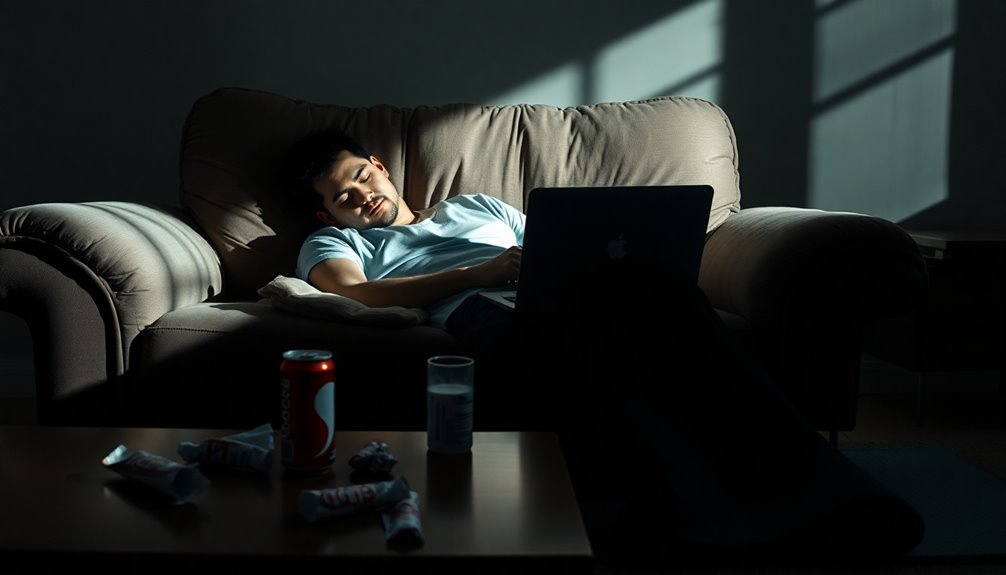
When you spend prolonged periods sitting, your body can quickly start to show signs of distress. A sedentary lifestyle brings several short-term health risks that can impact your daily activities.
You may notice:
- Muscle tightness in your hips and legs
- Decreased range of motion when bending
- Back pain from poor posture
- Stiffness affecting your overall function
- Difficulty reaching for objects or tying your shoes
These immediate effects can make even simple tasks feel challenging.
Strategies to Combat Sedentary Behavior
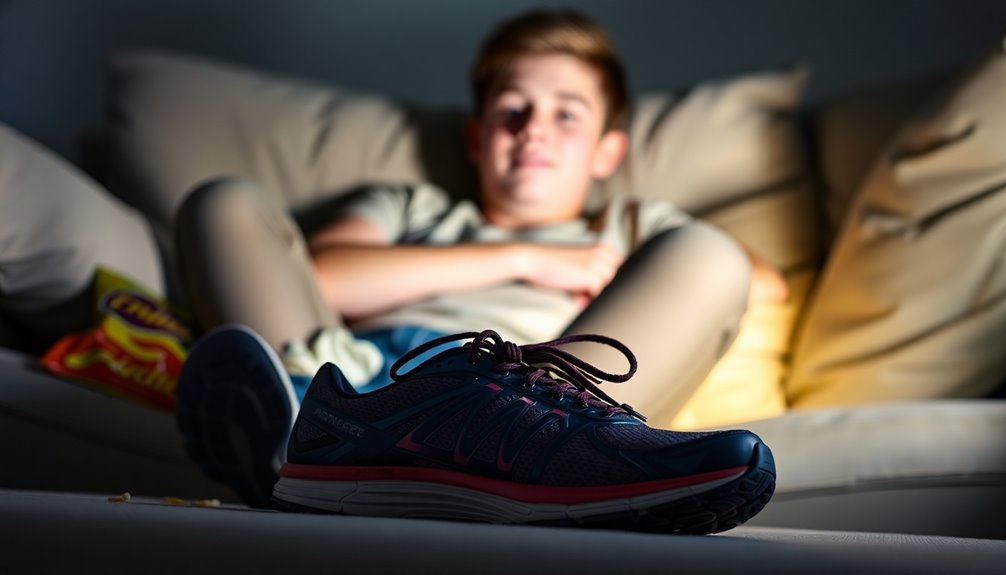
To effectively combat sedentary behavior, it's crucial to integrate movement into your daily routine.
Start by taking short physical activity breaks every hour; these can help improve circulation and reduce muscle tightness. If you work at a desk, consider using a standing desk or ergonomic furniture to encourage more dynamic postures throughout the day.
You can also replace traditional meetings with standing or walking meetings to increase movement. Engage in leisure activities that promote physical activity, like walking groups or other active hobbies, to enhance both your health and social interaction.
Don't forget to set stretch reminders; these simple actions can greatly help combat sedentary behavior and contribute to your overall well-being. Additionally, incorporating regular exercise as part of your daily routine can significantly enhance your physical and mental health.
Importance of Regular Movement
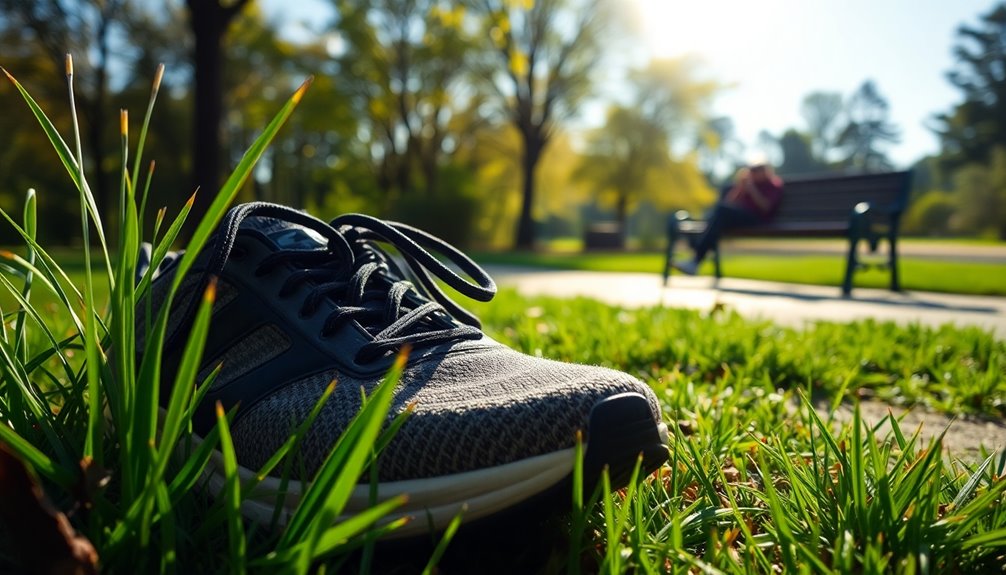
Incorporating regular movement into your daily life is essential for mitigating the negative effects of a sedentary lifestyle. Short bursts of physical activity can enhance flexibility, alleviate stiffness, and improve your overall posture.
Here's why making movement a priority matters:
- Reduces muscle stiffness, especially in your hips and back
- Enhances your posture, minimizing discomfort and pain
- Boosts energy levels, helping you feel more awake and alert
- Elevates your mood, countering feelings of lethargy
- Improves overall physical function, making daily tasks easier
- Regular movement can also help improve indoor air quality by reducing the accumulation of allergens and pollutants in your environment.
Frequently Asked Questions
What Are the Consequences of a Sedentary Lifestyle?
A sedentary lifestyle can lead to several consequences that affect your daily life.
You might notice tight muscles, especially in your back and legs, making it harder to bend or stretch. Poor posture often develops, resulting in discomfort and pain.
You may also experience low energy levels, which can hinder your motivation to stay active.
If you don't incorporate movement into your routine, you'll likely struggle with overall physical performance and endurance.
What Is a Short-Term Consequence of a Sedentary Lifestyle Quizlet?
When you think about a short-term consequence of a sedentary lifestyle, you might notice that your flexibility decreases.
You could find yourself feeling stiff, especially in your hips and back. Everyday tasks, like bending down or reaching for something, might become more challenging.
You may also experience muscle tightness and back pain. Incorporating some physical activity into your routine can help counter these effects, improving your range of motion and overall energy levels.
What Are 3 Short Term Effects of an Inactive Lifestyle?
If you're leading a lackluster lifestyle, you might notice some pesky problems popping up.
First, you could feel stiffness in your muscles, making movement a struggle.
Second, your mood might dip, leaving you feeling down and drained.
Finally, you may experience discomfort, like back pain, due to prolonged sitting.
These short-term effects can sneak up on you, but a little activity can help you bounce back and feel better quickly!
What Is a Short Sentence for Sedentary?
A sedentary lifestyle means spending long hours sitting or lying down without much physical activity.
You might notice that after a day of inactivity, your body feels stiff and your muscles are tight.
It can even become hard to move comfortably, especially if you try to do something active.
Conclusion
To conclude, embracing a sedentary lifestyle can lead to immediate consequences, like fatigue and mood swings, that leave you feeling like a smartphone stuck on low battery. By incorporating regular movement into your day, you can recharge your mental and physical well-being. Remember, just like a phone needs to be plugged in to function properly, your body thrives on activity. So, take those breaks, stretch, and keep your energy levels high for a more vibrant life!









